Celebrate Our Staff – October 2020
Here we celebrate our colleagues’ achievements across the University this past month.
Future Leader Fellows: (from left) Dr Benitez-Alfonso and Dr Walsh

UKRI Future Leader Fellowships
Dr Yoselin Benitez-Alfonso from the School of Biology and Dr Catherine Walsh from the School of Physics and Astronomy have both been awarded Future Leader Fellowships by UK Research and Innovation (UKRI).
Dr Benitez-Alfonso’s cross-disciplinary research centres on the biophysical and biomechanical properties of cell walls surrounding plant intercellular channels, and their potential uses in the development of new strategies for crop improvement and biomaterial development.
The fellowship award will enable her to explore new ways to improve the growth of crops and their resilience to climate change, as well as examine how unused plant resources can be repurposed to create new biomaterials, which could be used as sustainable alternatives to plastics in manufacturing and packaging.
Dr Benitez-Alfonso said: “It is exhilarating to receive this award, which gives me the means to pursue my most ambitious ideas, to make an impact in the scientific landscape worldwide and to lead innovations and breakthroughs that, in the future, can help us to meet our growing demand for food and for sustainable biomaterials.”
Astrochemistry expert Dr Catherine Walsh focuses her research on the unique chemistry that occurs in the space between the stars and during the formation of stars and planetary systems, and how chemistry in space creates life-friendly molecules for seeding habitable environments.
During her Future Leader Fellowship, she will build and lead a multidisciplinary team with expertise in physical chemistry, climate science and astrochemistry to conduct sophisticated simulations of the chemistry of the atmospheres of potentially habitable exoplanets.
Dr Walsh said: “I am delighted and indeed honoured to have been awarded a Future Leader Fellowship.
“One of the great questions of humanity is ‘are we alone?’ and discovering another planet that is capable of potentially supporting life is the first step to answering that question.
“The next decades of astrophysics research will be very much focused on this search for potentially habitable worlds around other stars. I am very excited to build my team, to develop our state-of-the-art simulations and to contribute to this great quest.”
Ensuring disabled people’s voices are heard loud and clear
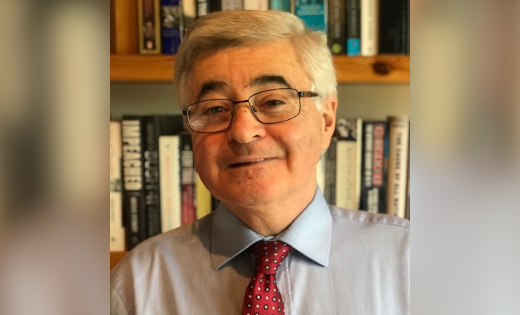
Professor Gerard Quinn has been confirmed as a UN Special Rapporteur
Professor Gerard Quinn – Chair in International Disability Law at the School of Law – has been confirmed as the next UN Special Rapporteur on the Rights of Persons with Disabilities.
Professor Quinn is a member of the Centre for Disability Studies and Centre for Law and Social Justice at Leeds, and he will bring to this important role a passionate commitment to ensuring disabled people’s human rights are guaranteed, their dignity is respected and their wellbeing is assured.
Professor Quinn has stated that some of his immediate priorities will be to ensure that as the world reacts to crises facing humanity – including covid-19, climate change and the scourge of armed conflicts – disabled people are not forgotten.
He wants to ensure their voices are heard loud and clear, within global responses.
Professor Quinn also wants to focus the world’s attention on all the positive contributions disabled people are making to peace-building, nation-building and development, globally.
Ever conscious of the need for systemic change to build on the gains of the UN Convention on the Rights of Persons with Disabilities (CRPD), he will also be drawing attention to the need for structural and cultural change, to help achieve the UN Sustainable Development Goals.
Research helps tackle Long Covid cases
 Research by Dr Manoj Sivan has shed new light on Long Covid
Research by Dr Manoj Sivan has shed new light on Long Covid
Research led by Dr Manoj Sivan (Leeds Institute of Rheumatic and Musculoskeletal Medicine) has led to the country’s first integrated NHS covid-19 rehabilitation service being established in Leeds.
Prompted by concerns about the – at that point unknown – potential long-term problems that may face those recovering from covid-19, Dr Sivan led a team to analyse the outcomes of previous Severe Acute Respiratory Syndrome (SARS) and Middle East Respiratory Syndrome (MERS) outbreaks.
The study was published in May 2020, and has been heavily cited since.
It also prompted the team to develop C19-YRS – the first screening tool for what has increasingly been referred to as Long Covid.
By July, the team had published the first UK study into Long Covid symptoms, which prompted Leeds commissioners and NHS England to fund the establishment of a covid rehabilitation service – the first of its kind in the country.
Since appearing in an interview on BBC Radio 4’s Inside Science, patients from all across the country have been in touch requesting that Dr Sivan assess them, and for them to be managed in the Leeds covid rehabilitation service.
Dr Sivan said: “I studied medicine to help others in their lives and have always aimed at improving quality of care and innovation in our wonderful NHS.
“I’m pleased my skills have proved useful to many patients in Leeds and all over the country during the current crisis.”
The service model his research has helped create is now being adopted in other NHS trusts, and their screening tool – C19-YRS – has been translated into French, Spanish Nepali and other international languages, and is currently being used in numerous research studies around the world.
Dr Sivan is now collaborating with low- and middle-income countries to set up an international covid telerehabilitation (T-CORE) study that will replicate the Leeds model overseas.
‘Thrilled’ to secure prestigious director role
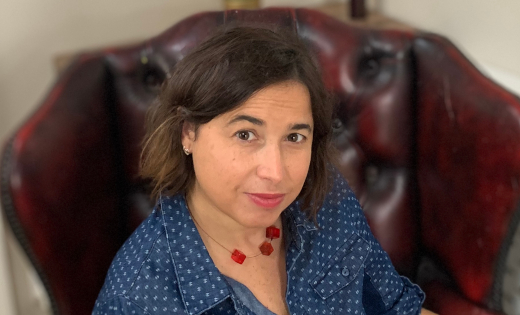 AQUALM Director Dr Ana Manzano
AQUALM Director Dr Ana Manzano
Dr Ana Manzano (School of Sociology and Social Policy) has been appointed as Director of Advanced Qualitative Methods (AQUALM) at the White Rose Doctoral Training Partnership (WRDTP).
The WRDTP is accredited by the Economic and Social Research Council (ESRC) to offer comprehensive doctoral training through seven interdisciplinary thematic multi-institutional pathways, across the social sciences at the Universities of Leeds, Sheffield, York, Bradford, Sheffield Hallam, Hull and Manchester Metropolitan.
As AQUALM Director, Dr Manzano will plan, identify, contribute and promote training opportunities to the seven WRDTP universities for doctoral-level research training and also capacity building for research methods generally.
Dr Manzano is an associate professor in public policy, with an interest in the relationship between research methods, evidence and policy making.
She has an established international reputation as an innovative methodologist expert in realist evaluation – a form of mixed-methods theory-driven methodology to evaluate complex interdisciplinary interventions, programmes and policies.
Dr Manzano said: “I am thrilled to have been appointed as WDRTP AQUALM Director.
“These are difficult times for our postgraduate research student community, many of whom have seen their projects severely disrupted by the pandemic. Current challenges require a responsive and clear focus on an adequate mixture of general, transferable and advanced skills that can strengthen students’ projects and enhance their future employability.
“Training is more important than ever so we can make sure our postgraduate research students continue to feel supported, and have opportunities to engage with their peers and with wider academic networks.”
Funding projects to help tackle climate change
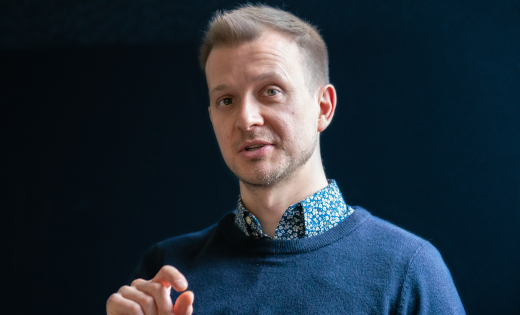 The funding model was devised by Dr Mark Davis
The funding model was devised by Dr Mark Davis
Community Municipal Investments (CMI) has raised more than £1 million for local net-zero projects.
The funding model – devised by Dr Mark Davis (School of Sociology and Social Policy) – aims to encourage residents to fund projects to help tackle climate change.
Individuals can invest as little as £5 in a council-issued bond that supports a specific infrastructure project.
West Berkshire Council launched the UK’s first CMI and hit its £1 million target five days early. Leeds City Council is now planning to use the model to fund a £1 million project to provide solar energy for up to 10 high-energy-consuming public buildings.
Dr Davis said: “After four years of research, it’s exciting to see CMIs now moving money to help the green recovery.
“With £1.6 million already invested via two CMIs, I’m now working to scale the model further by supporting other UK councils in launching CMIs to drive further investment into local net-zero projects.
“I think the success of CMIs shows what’s possible for the kind of proactive and interdisciplinary social science we have at Leeds. Working in partnership with industry, the public sector and professional services, we’re well placed to lead on delivering creative solutions to the grand challenges we all face. I’d like to thank colleagues across campus for all their support with this research.
“If we want the world to be fairer, more equitable and more sustainable, then we are going to have to do different things with our money.”
Fellowship award ‘delight’
 NIHR awarded Dr Samuel Smith an Advanced Fellowship
NIHR awarded Dr Samuel Smith an Advanced Fellowship
Dr Samuel Smith (School of Medicine) has been awarded a National Institute of Health Research (NIHR) Advanced Fellowship.
His work will focus on supporting medication adherence in women with breast cancer.
During the next six years the award, worth about £1.3 million, will involve a pilot and an optimisation trial with support from the Leeds Clinical Trials Research Unit (CTRU).
A behavioural scientist specialising in cancer prevention and control, Dr Smith originally joined the University in 2016 as a Yorkshire Cancer Research University Academic Fellow.
He has also been supported in the past by Cancer Research UK.
Of the Fellowship, Dr Smith said: “I’m absolutely delighted to be awarded an NIHR Advanced Fellowship; it gives me the time to engage in additional research training with the University of Leeds Clinical Trials Research Unit, while also building a team to tackle a major issue in breast cancer care.
“I’m looking forward to the next six years!”
Reward for significant contribution to Student Education
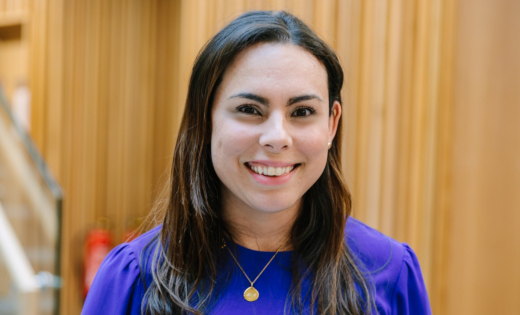 Leeds University Business School’s Dr Estrada-Robles
Leeds University Business School’s Dr Estrada-Robles
Dr Mariana Estrada-Robles (Leeds University Business School) has obtained the Postgraduate Certificate in Academic Practice (PGCAP).
This is a post-induction programme for colleagues who make a significant contribution to Student Education at Leeds.
It is accredited by Advance HE, which has also awarded her Fellowship of the HEA (Advance HE was previously known as the Higher Education Academy).
Dr Estrada-Robles said: “I am delighted to have finished the PGCAP – it has been a very rewarding experience.
“This 18-month programme has been a fantastic opportunity to develop my teaching philosophy and to position my teaching practice within my discipline, the University and the wider Higher Education context. It has also allowed me to have a more open dialogue with my students and to understand the concepts underpinning student education, with aims to create a greater learning experience for my students.
“I encourage anyone who wants to enhance their teaching practice or is looking to obtain the Advance HE Fellowship to consider studying the PGCAP.”
The programme adopts an holistic approach to student education through critical and challenging tasks in each of its three modules.
It also uses reflection, peer and self-assessment, as well as active learning, to offer participants the opportunity to explore and apply different theories of learning, innovative pedagogies and inclusive learning.
“To enhance my teaching practice and to continue developing my teaching identity, the PGCAP has imprinted long-term habits in me, such as permanent reflection, self-assessment and constant search for personal development,” added Dr Estrada-Robles.
“Being part of communities of practice and sharing with peers is also something I plan to continue in the future.”
Stellar award for commitment to excellence
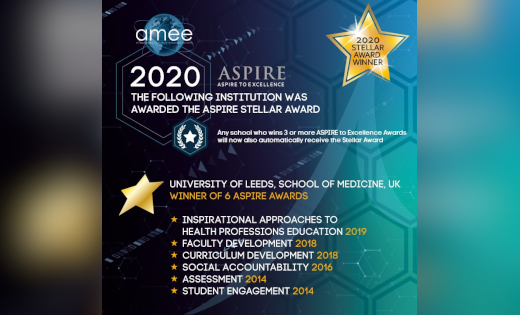 The School of Medicine was honoured for excellence in medical education
The School of Medicine was honoured for excellence in medical education
The School of Medicine is celebrating after receiving an ASPIRE Stellar Award for its commitment to excellence in medical education.
The award, granted by the International Association of Medical Education (AMEE) is one of only two awarded to medical schools globally – the other being in the USA.
It is based on having a track record of outstanding performance in different areas of medical education, as recognised through receipt of individual ASPIRE to Excellence Awards.
We lead the rest of the world, having six awards in the following categories:
- Assessment (2014)
- Student Engagement (2014)
- Social Accountability (2016)
- Faculty Development (2018)
- Curriculum Design (2018); and
- Inspirational Approaches to Health Professions Education (2019).
Each ASPIRE award involves submitting evidence against criteria that’s judged by an international panel of experts in the field as world class.
Submissions for each individual award were led by staff in the Leeds Institute of Medical Education (LIME), with contributions from academic, clinical and professional services staff across the School, as well as from students, NHS partners and the Patient-Carer Community.
Dr Anne-Marie Reid, Director of Student Education, Undergrad Medical Education, LIME, said: “I am thrilled that we have received this award, particularly at a time of such challenge for us all. It represents a huge amount of team effort, innovation and great leadership over a sustained period and is a real tribute to LIME and to the School.
“It bodes well as we enter a new era where innovation is needed more than ever to ensure that we continue to work together to deliver excellence in medical education and graduate fantastic doctors.”
Leaders of the Future recognised
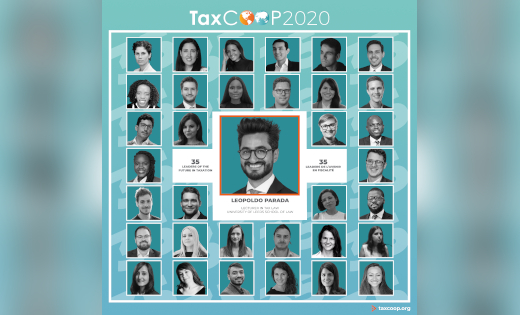 TaxCOOP2020 recognised a number of rising stars, including Dr Leopoldo Parada
TaxCOOP2020 recognised a number of rising stars, including Dr Leopoldo Parada
Dr Leopoldo Parada (School of Law) has received recognition for his work in the area of tax law.
He has been named on the TaxCOOP 35 Leaders of the Future list as part of the TaxCOOP2020 World Tax Summit, which took place online from 13-15 October.
TaxCOOP encourages the involvement of young leaders in promoting tax justice around the world, and Leaders of the Future is a distinguished recognition programme highlighting the most promising young tax policy enthusiasts.
Those featured on the list were selected for their academic and professional commitment and their potential to shape the international tax system.
Among the 2020 laureates were 19 women and 16 men, collectively representing 23 countries.
Dr Parada said: “I am very honoured and excited to receive this important recognition, which represents a payoff for many years of hard work.
“I really hope to keep contributing to the shaping of international tax policy with provoking ideas that can be adapted to a reality that is in constant evolution.”
Outstanding Doctoral Thesis Award
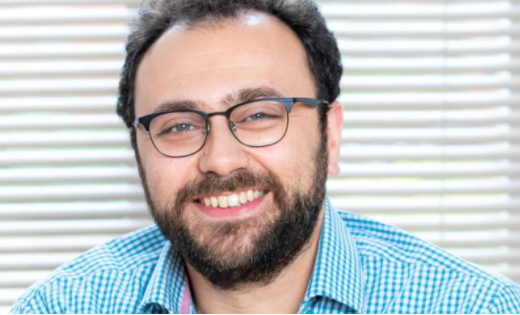 Research Fellow Dr Oksuz received the award
Research Fellow Dr Oksuz received the award
Dr Dogus Oksuz – a Research Fellow at the Centre for Language Education Research – has received the Institute for Corpus Research Outstanding Doctoral Thesis Award.
The purpose of this annual accolade is to recognise and reward outstanding theses in the field of Corpus Linguistics.
Dr Dogus Oksuz’s PhD was titled Collocational Processing in Typologically Different Languages, English and Turkish: Evidence from Corpora and Psycholinguistic Experimentation. It combined extensive analysis of corpus data with a series of psycholinguistic experiments to examine how linguistic typology affects processing in English and Turkish by native and non-native speakers of these languages.
Dr Oksuz said: “I am absolutely delighted and honoured to have received the Institute for Corpus Research Outstanding Doctoral Thesis Award.
“My PhD study was a multidisciplinary work, involving both corpus analysis and psycholinguistic experimentation. Such esteemed feedback gave me new impetus to continue my research with enthusiasm.”
He conducted his PhD research in the Centre for Corpus Approaches to Social Science at Lancaster University, which is part of Department of Linguistics and English Language.
Some of the findings based on this research are reported in an article published in Language Learning earlier this year.
Gold for going green!
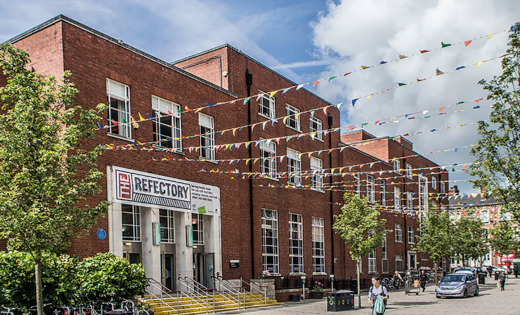 The Refectory was one of the venues audited earlier this year
The Refectory was one of the venues audited earlier this year
Three MEETinLEEDS accommodation and event venues have been accredited with Green Tourism Gold status.
Five of our buildings, including three conference venues and residences, were audited by the Green Business Tourism Scheme in August, and successfully retained their Gold level accreditation as sustainable businesses.
Henry Price Residences, Storm Jameson Court and The Refectory were among the venues and residences audited against a set of criteria that covered reducing energy; saving water; efficient and eco-friendly waste disposal; ethical buying; staying local and seasonal; minimising food miles; promoting biodiversity; and adopting a smart sustainable outlook from top to bottom.
The awards certification programme recognises the commitment of tourism-facing businesses, which are actively working to become more sustainable.
We started working with Green Tourism in 2011, and 10 residential and catering sites now hold the Gold level accreditation, scoring more than 80% in audits, which are repeated every two years.
The audit reports highlighted many areas of good practice, including the work of both student and staff sustainability architects to help improve performance in our residential and catering operations.
Harriet Boatwright, Sales and Marketing Manager at MEETinLEEDS, said: “Our Green Tourism accreditation continues to be an important benchmark on our journey towards a more sustainable way of doing business, and we are so very proud of our golds!
“Collaborating with the many committed and passionate teams here at the University, we are glad to be able to boast of such an accolade within our venue and residential portfolio. The ongoing commitment to sustainability at the University is something that we are very pleased to be able to share with our customers.”
Online courses are Class act!
 Class Central have once again recognised our digital courses
Class Central have once again recognised our digital courses
Four of our online courses have ranked in The Best Online Courses of All Time on Class Central, demonstrating once again that we’re among the top institutions in the world for digital learning.
Class Central is a leading search engine and review site for online courses. The Best Online Courses of All Time rankings have been published on the site since 2016, based on thousands of reviews written by real learners.
In 2020, Class Central’s rankings feature courses from about 100 universities in 23 countries. Leeds features in the list alongside distinguished institutions such as Harvard University and Hong Kong University of Science and Technology.
Leeds’ courses that feature on the list are:
- Critical Thinking at University: An Introduction
- Transport Systems: Global Issues and Future Innovations
- Improving Healthcare Through Clinical Research
- Ecology and Wildlife Conservation
Each has received an average of 4.5 or five stars on the Class Central website, placing them firmly among the rankings of the top 200 courses.
This is not the first time we’ve performed well in Class Central’s rankings, either. We featured more frequently than any other institution in Class Central’s Best Online Courses of 2019, with four in top 30.
Once again, such an accolade has only been possible through the hard work and dedication of the academics and teams behind these courses, particularly with the recent rise in the importance – and visibility – of online learning.
Get in touch!
We know there are lots of great things happening to support the work of the University in these testing times, and we want to hear about them.
Please follow the staff Twitter account to see the latest updates and copy in our @UniLeedsStaff handle when posting success stories, so we can share them with colleagues.
You can also contact Internal Communications directly if you or one of your colleagues would like to appear in this monthly feature. This is open to all staff – professional and academic.
Posted in: University news